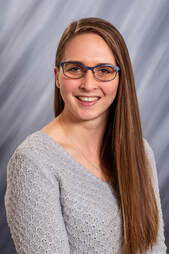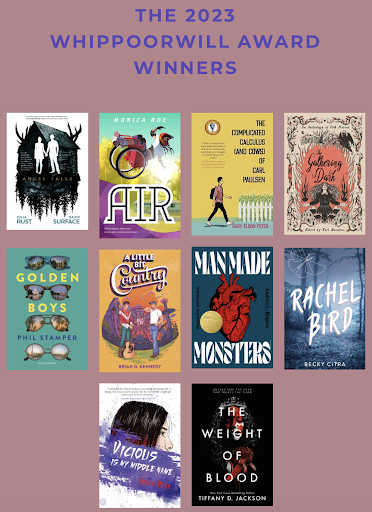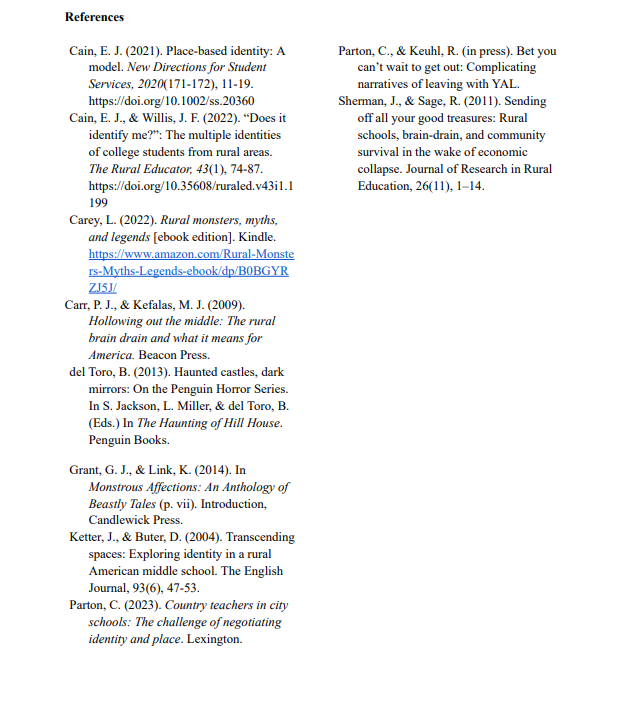| Erika L. Bass is an Assistant Professor of English Education at the University of Northern Iowa. Her research focuses on writing instruction, rural education, and teacher preparation; often those areas converge. She is currently working on a book manuscript on critically placed writing with rural high school students, conducting rural-focused book studies with secondary English teachers in her state, and writing feedback partnership to help preservice teachers engage in providing writing feedback to high school students. She is also a member of the Whippoorwill Award Committee for rural Young Adult novels and serves as the academic advisor for the English Teaching program at UNI. In her free time, she enjoys taking her dogs for walks and playing slow-pitch softball. Chea Parton grew up on a farm and still considers herself a farm girl. She has been a rural student, a rural English teacher, and is currently a visiting assistant professor at Purdue University where she works with future teachers through the Transition to Teaching Program. She is passionate about rural education. Her research focuses on the personal and professional identity of rural and rural out-migrant teachers as well as rural representation in YA literature. She currently runs Literacy In Place where she seeks to catalogue rural YA books and provides teaching resources, hosts the Reading Rural YAL podcast where she gives book talks and interviews rural YA authors, and serves on the Whippoorwill Book Award for Rural YA Literature selection committee. You can reach her at [email protected]. |
Several of the criteria the Whippoorwill Committee uses to evaluate submissions revolve around the representation of rural identities (The Whippoorwill Committee, 2020) including these:
- The literature portrays characters and settings accurately and authentically in terms of physical characteristics, social and economic statuses, intellectual abilities, and other human attributes.
- The literature avoids stereotypes of rural people and places by representing the complexities of the situation, problem, and/or people.
- The literature contributes to the body of diverse YA literature by providing representations of diverse people and places.
Horror and Rural Identity
The identities of both places and people play a huge role in the construction of horror stories. In 2022, author Liz Carey compiled a collection of Rural Monsters, Myths, and Legends, stories originally published in the rural online news source and then compiled into a book published for adults. In the teaser summary, Carey noted that rural places have “forested woods…remote lakes…and sprawling fields…[creating] plenty of room for the wild and weird to take root” (Carey, 2022, unpaged). However, rural horror stories are not always as simple as being far fetched or scary; in fact, “they offer a valuable window into the unique culture and community of places often unseen and underappreciated” (Carey, 2022). Examining the impact of monsters, myths, and legends can highlight important nuances of the rural communities in which those events happen.
Likewise, horror is rooted in primal empathy because mortal humans all share the same weaknesses and are connected to one another by our fears of death, disease, and loss (as well as our search for joy, love, and community). So, “to learn what we fear is to learn who we are. Horror defines our boundaries and illuminates our souls” (del Toro, 2013, p. xi). Further, horror provides opportunities for readers to acknowledge, name, and critique the worst aspects of our world—to critically read what is “wrong with the world” (Link & Grant, 2014, p. vii)—and who they are in it. Horror doesn’t shy away from the negative aspects, from the monsters, of the world so that we might call them by their names and vanquish them.
This year’s winners include several texts that use horror conventions to invite critical thinking and discussions about rural people and places. Angel Falls by Julia Rust and David Surface explores generational trauma and healing through the use of the preternatural and the geographical features Carey (2022) describes. The Weight of Blood by Tiffany D. Jackson invites readers to face rural sundown towns and their role in the systemic oppression of Black folks. Man Made Monsters by Andrea L. Rogers traces how systems of White supremacy and Indigenous oppression have impacted past, present, and future generations of rural Native people. The Gathering Dark, a collection of short stories from contributing editor Tori Bovalino, explores a number of issues salient to rural places such as the conflict to leave or stay, feelings of isolation and connection, and what it means to be an insider/outsider of the community. All these stories face and critique social issues that exist in rural places; however, none of them paints rural people and places as all bad—or all scary. The treatment of rural communities and the issues that exist in them invite nuanced and critical readings of the identities of rural people and places, asking us to think about how we can make the world better.
Queer Identities in Rural Places
Just as horror gives us a specific look into the darkness that exists in the world, the number of submissions of books containing queer rural identities provide evidence of folks who are striving to bring light into darkness. In our current cultural moment multiple legislative decisions, all-to-frequent book bans, and near constant political rhetoric have made life more difficult for folks with queer identities, including those in rural spaces. Rural identity is complex; it includes both objective and subjective components. This means that rural identity is tied to places of residence and work, but also social and cultural meanings (Cain, 2021). Growing up rural means taking on many societal and cultural perceptions and reconciling those with individual perceptions of identity. Rural students develop an understanding of themselves as individuals and how they identify by reconciling their self-perceptions and how they are perceived by others (Ketter & Buter, 2004). Because of this, rural students who are navigating identity exploration are often marginalized and are underrepresented. The increase of submissions featuring rural LGBTQIA+ identities helps to “negate the assumption that rural students are monolithic and that rural areas lack diversity” (Cain & Willis, 2022, p. 75).
Award winners telling queer rural stories this year included stories with characters that both accepted and struggled to accept their LGBTQIA+ identities, and stories where their LGBTQIA+ identities were both challenged and heart-warmingly accepted by families and community members. For example, The Complicated Calculus (and Cows) of Carl Paulsen by Gary Eldon Peter features a gay main character who knows and accepts his queerness as he works to navigate how that identity fits into the greater identity landscape of the people around him. In A Little Bit Country, readers see both—a character who tries to hide and deny his queerness and another who accepts it openly—while occupying a rural town. Among other salient themes, many of this year’s winners highlight the complexities of navigating rural places as queer youth. They don’t shy away from the challenges that queer rural young folks can face, but they also don’t depict rural places as wholly homophobic, offering readers an opportunity to engage with a more complex understanding of rural places.
In-/Out-Migration
Rural places and people are not static. Rural people frequently out-migrate and leave their rural towns when their line of work or goals or interests lie outside of their rural hometown (Parton, 2023). Despite the dominant narrative that in order to be somebody, rural young folks must leave their hometowns, sometimes they leave and stay gone for good and sometimes they return (Carr & Kefalas, 2009; Parton & Kuehl, in press; Sherman & Sage, 2011). Whenever geospatial borders are crossed, cultural exchange happens and the people and places are changed in the process, revealing aspects of the cultural practices and knowledges associated with those places (Parton, 2023).
Three of this year’s winners featured in-/out-migration in ways that invite readers to think about how we define rural identity and what qualifies as a rural book. In Rachel Bird by Becky Citra and Vicious Is My Middle Name by Kevin Dunn, the main characters move to live in rural places that belong to their mothers but not to them. Rachel, in Rachel Bird, moves with her sister to live with grandparents she’s never met on a remote Canadian ranch. Though she is from people who have generational ties to the land, Rachel does not (initially) identify as rural and it takes time before she chooses to learn the place of her people. Syd, in Vicious Is My Middle Name, moves to live with her grandparents in rural Appalachia. She too is from the people but not the place. Like Rachel, she learns and cares deeply for that place throughout the book, eventually fighting for its survival.
An out-migrant story, Phil Stamper’s Golden Boys tells the story of four friends from rural Ohio who end up in nonrural places during the same summer. One travels to France to study abroad, one travels to Boston to save the trees in Boston’s park system, one stays with family in Florida to work at their arcade, and one takes an internship with a senator in Washington, D.C. Although the majority of the action does not take place in a rural setting, Golden Boys is a Whippoorwill Book book because it tells the story of four rural people. Despite leaving their rural town, all the boys grapple with and maintain their rural identities. As rural people in nonrural places, their interactions with nonrural people reveal and highlight rural culture and knowledge.
One final identity that we saw this round (and that we’d like to see more of) is the representation of rural people with disabilities. There are characters with disabilities in both Golden Boys and Air by Monica Roe. Air, in particular, addresses the challenges of having a physical disability in a small rural place, particularly in terms of infrastructure. Emmie’s school's lack of accessibility for folks who use wheels for mobility drives the action of the plot. Her story gives readers the opportunity to think about rural infrastructure and support as well as what it really looks like and means to help someone.





 RSS Feed
RSS Feed